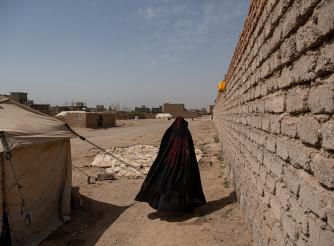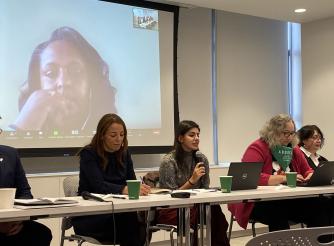ActionAid calls for a feminist response to corporate abuse as new report exposes persecution and mistreatment of women in four communities

A new report from ActionAid reveals shocking corporate abuse of women from communities in Uganda, Zimbabwe, Kenya, and Guatemala.
The report, released ahead of the 8th session of negotiations of the United Nations Intergovernmental Working Group on a proposed Binding Treaty on Business & Human Rights in Geneva this month, calls for a feminist international corporate accountability framework.
A new report by ActionAid has exposed the ways in which women disproportionately experience human rights abuses and violations at the hands of Transnational Corporations (TNCs). To date, these forms of abuse have been excluded from corporate accountability frameworks meaning TNCs continue to get away with corporate abuse and its gendered impact in communities across the world.
The report – Pathway to A Feminist International Corporate Accountability Framework - demonstrates the impact of large-scale agribusiness and mining malpractices on women from rural communities in the Global South by exploring four examples and sets a pathway to achieve a feminist framework that places women at the centre.
In Uganda, over 35,000 people were internally displaced as a result of agribusinesses linked to the Global North. Women from Kapapura Nyamuntende and Kiryandongo communities were raped, evicted by armed men, and forced to work for the company responsible for destroying their homes and farms.
"We just saw tractors during Christmas and started erasing our houses down, and we ran away since life is important."
Said a woman evicted from her land around sugarcane plantation, Uganda
Large-scale granite mining by Chinese and European companies in Zimbabwe has impacted the region's agricultural activities due to the widespread clearing of vegetation, interruption of natural river flows, and air, soil, water, and noise pollution. Many women from the Mutoko, Mt Darwin and Murehwa Districts of Zimbabwe depend on small-scale agriculture, livestock ranching, hunting, and gathering forest products, and grazing pastures.
Granite mining is a profitable business. Black granite, which is much sought after for construction purposes, is exported to South Africa, the European Union, the United States, and Mozambique (with 90% of the granite imported by the latter exported on to Italy and Spain).
In Guatemala, women advocating for their communities have faced criminalisation and repression following the environmental damage caused by nickel mining companies.
These shocking examples demonstrate the way women from groups in various contexts experience diverse forms of corporate abuse highlighting the need for a feminist response.
Anna Hengeveld, Policy Adviser for Gender & Corporate Accountability at ActionAid, said:
"The devastating impact business activities can have on women and their communities calls for urgent action... [During] This 8th session, it is key that states engage constructively and build upon progress made so far based on the demands of affected people and communities. It is time states come together to ensure a Feminist Binding Treaty on Business and Human Rights becomes a reality."
Josephine Chiname of Zimbabwe Environmental Law Association spoke on the importance of providing remedy for effected communities in Zimbabwe:
"Given the human rights violations that have been prevalent in the Zimbabwean mining sector, the voluntary mechanisms are not enough and are not bringing justice to the communities. As we approach the 8th session, it is important that the text of the proposed legally binding instrument sets regulations that are binding, that are strong enough to prevent harm and provide remedy for communities."
To contact the ActionAid press office email media-enquiries@actionaid.org
Notes to editor:
The full report can be accessed here
Key findings of the report
- Large-scale agriculture activities in Uganda, including sugarcane, soybeans, maize, and grains by TNCs including Agile Partners, Kiryandongo Sugar Limited, and Great Season SMC limited, led to 35,000 people being forcibly evicted in the Kiryandongo district of Mid-Western Uganda.
- Nickel mining in Guatemala by Solway Investment Group (with headquarters in Switzerland) has resulted in water pollution and loss of livelihoods for the indigenous Maya Q'eeqchi people in the departments of Izabel and Alta Verapaz.
- Black granite mining in Zimbabwe by Ilford Services Mining Company, Quarrying Enterprises, Zimbabwe International Quarries, Natural Stone Export Company, and Chinese-owned companies are implicit in labour rights abuses and have caused environmental degradation in the Mutokoo MT Darwin and Murehwa districts in Zimbabwe.
- Sisal cultivation in Kenya by Teita Sisal Estate Limited has affected communities in Taita Tavet County in Southern Kenya, covering over 32,000 acres of land. The human rights harm to women includes an increase in sexual violence, an increase in care and work burden, and forced evictions.
The report is endorsed by ACCA, Act Alliance, AWID, FIDA Uganda, ISHR, IWRAW Asia Pacific and ZELA.
About the proposed United Nations Binding Treaty on Business & Human Rights
In June 2014, the UN Human Rights Council in Geneva convened to draft an international legally binding instrument that would regulate Transnational Corporations (TNCs) and businesses in relation to human rights. An open-ended intergovernmental working group (IGWG) was formed to develop this legally binding instrument. The Third Revised Draft and the textual proposals submitted by states at the 7th session will serve as the basis for the discussions at the event taking place on 24th – 28th October.
About ActionAid's Combatting Modern Slavery Project
ActionAid launched its three-year Combatting Modern Slavery project in 2021 with funds from the Norwegian Agency for Development Cooperation (Norad). The project supports ActionAid Ghana, ActionAid Ethiopia, and their partners to prevent, identify and address modern slavery through advocacy and community sensitization while protecting vulnerable groups and providing care and support to survivors of modern slavery. The project also works toraise awareness about modern slavery in business operations and supply chains and advocate for Government engagement in negotiations for a legally Binding Treaty on Business & Human Rights


